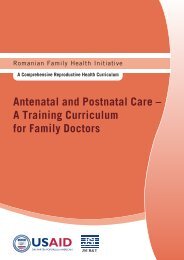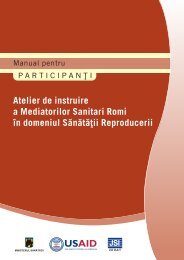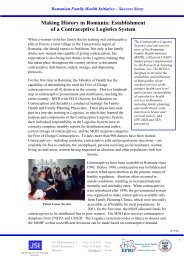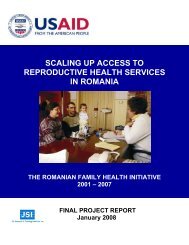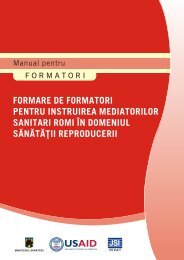Training of Roma Health Mediators in Reproductive Health
Training of Roma Health Mediators in Reproductive Health
Training of Roma Health Mediators in Reproductive Health
You also want an ePaper? Increase the reach of your titles
YUMPU automatically turns print PDFs into web optimized ePapers that Google loves.
• Ask themselves questions<br />
• Consider the alternatives<br />
‣ What is the importance <strong>of</strong> the step Information on the step Reflection?<br />
Information provided must:<br />
• Be relevant to the women’s <strong>in</strong>terests and needs<br />
• Be complete, precise, and clear; and be understood by the women<br />
‣ What can/should a mediator do to facilitate the decision-mak<strong>in</strong>g process for women?<br />
• Imag<strong>in</strong>e the needs/<strong>in</strong>terests <strong>of</strong> women <strong>in</strong> our communities based on our experience <strong>in</strong><br />
work<strong>in</strong>g with them<br />
• Help women express their needs, concerns and questions, as well as their reactions to what<br />
we tell them; and listen carefully<br />
• Adapt <strong>in</strong>formation to the needs/<strong>in</strong>terests <strong>of</strong> <strong>in</strong>dividuals; encourage their questions and<br />
reactions (<strong>in</strong> order to better understand, and respond to, their concerns and needs)<br />
• Give women time to reflect on the <strong>in</strong>formation before mak<strong>in</strong>g a decision<br />
‣ Do we usually respect the decision-mak<strong>in</strong>g process when we try to help women solve their<br />
health needs and concerns?<br />
No. Often we give <strong>in</strong>formation and expect women to decide immediately what they wish to do (as<br />
expressed <strong>in</strong> 'you should . . . , you ought to . . .' etc)<br />
‣ What are the consequences <strong>of</strong> such rushed/forced decisions?<br />
Either the woman doesn't act at all or she makes a decision without adequate thought and without<br />
conviction. Often, the woman does not follow through with/implement such decisions. Sometime<br />
the woman carries out her decision but does not accept responsibility for any problems associated<br />
with the decision and may even blame the mediator for any negative consequences <strong>of</strong> the decision.<br />
‣ What should be the role <strong>of</strong> the mediator <strong>in</strong> communicat<strong>in</strong>g with women <strong>in</strong> the context <strong>of</strong> this<br />
process <strong>of</strong> decision-mak<strong>in</strong>g?<br />
• Give complete, precise, objective and clear <strong>in</strong>formation<br />
• Ask questions to help women to reflect on the <strong>in</strong>formation and on their choices<br />
• Follow-up with women to reduce the risk <strong>of</strong> problems once the decision is put <strong>in</strong>to action<br />
Expla<strong>in</strong> that sometimes a woman presents herself as hav<strong>in</strong>g a problem (for example an unwanted<br />
pregnancy, <strong>in</strong>decision about whether or not to use contraception, a relationship problem etc). In<br />
such cases, it may be difficult to know how to help her to resolve the problem <strong>in</strong> a way that is best<br />
for her. A simple problem-solv<strong>in</strong>g model is a useful tool to guide the mediator <strong>in</strong> help<strong>in</strong>g the<br />
woman.<br />
Post the flip chart Problem-solv<strong>in</strong>g Process and review it with the group.<br />
194<br />
RFHI/JSI <strong>Roma</strong>nia <strong>Tra<strong>in</strong><strong>in</strong>g</strong> <strong>of</strong> RHMs <strong>in</strong> <strong>Reproductive</strong> <strong>Health</strong> Session 13: BCC



